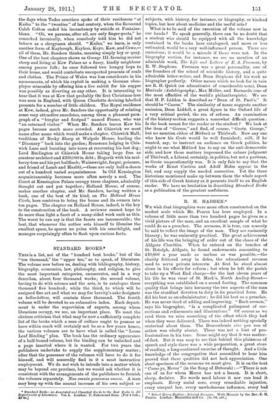STANDARD BOOKS.*
THIS is a list, not of the "hundred best books," but of the "ten thousand," the "upper ten," so to speak, of literature. The volume now before us, dealing with bibliography, history, biography, economics, law, philosophy, and religion, to give the most important categories, enumerates, and in a way describes, about four thousand works; the second volume, having to do with science and the arts, is to catalogue three thousand five hundred ; while the third, to which will be assigned fine art and what we may for brevity's sake designate as belles-lettres, will contain three thousand. The fourth volume will be devoted to an exhaustive index. Each depart- ment is under the supervision of experts, among whom librarians occupy, we see, an important place. To meet the obvious criticism that what may be now a sufficiently complete list of the books which a man of culture ought to possess or have within reach will certainly not be so a few years hence, the various volumes are to have what is called the "Loose Leaf Binding" plan. The book has the ordinary appearance of a half-bound volume, but the binding can be unlocked and a page inserted where it is wanted. For two years the publishers undertake to supply the s,upplementary matter; after that the possessor of the volumes will have to do it for himself, and will assuredly find in it a most instructive employment. We do not wish to intrude into a matter which may be beyond ourprovince, but we would ask whether it is consistent with the arrangements of the publishers to furnish the volumes separately. Non amnia possum= manes. A man may keep up with the annual increase of his own subject or • Standard Books : an Annotated and Classified Nu. de .to the Best Rooks in AU Dvartments of Literature. Vol. 1. London : T. Nelson and Sons. [For 4 vols., 46.]
subjects, with history, for instance, or biography, or kindred topics, but how about medicine and the useful arts ?
What is to be said of the execution of the volume now in our hands P To speak generally, there can be no doubt that a student who should be equipped with all the knowledge contained in the books here catalogued, and more or less estimated, would be a very well-informed person. There are omissions ; it would be a miracle if there were not. In the biography section, for instance, we see no mention of an admirable work, The Life and Letters of E. A. Freeman, bY R. W. Stephens. Freeman was a great personality, one of the founders of the school of scientific history, and a quite admirable letter-writer, and Dean Stephens did his work as biographer perfectly. Other names which we look for in vain are R. H. Quick (an educationist of considerable note), Dean Merivale (Autobiography), Max Midler, and Bernardo (one of the most effective of the world's philanthropists). We see that H. P. Liddon is described as "Dean of St. Paul's." It should be "Canon." The similarity of name suggests another omission, Dean Liddell, a great figure in the Oxford life of a very critical period, the era of reform. An examination of the history section suggests a somewhat difficult question : Is the book meant for the reader or the student ? We look at the item of "Greece," and find, of course, "Grote, George," but no mention either of Mitford or Thirlwall. Now any one who knew his Grote would be well furnished ; still, if he wanted, say, to instruct an audience on Greek politics, he ought to see what Mitford has to say on the anti-democratic side, and how these matters impressed the calmer judgment of Thirlwall, a Liberal, certainly, in politics, but not a partisan, as Grote unquestionably was. It is only fair to say that the works of Ernst Curtius and Adolf Holm appear in the list, and may supply the needed corrective. Yet the three historians mentioned make up between them the whole aspect of this side of Greek history as it presents itself to an English reader. We bare no hesitation in describing Standard Books as a publication of the greatest usefulness.






















































 Previous page
Previous page